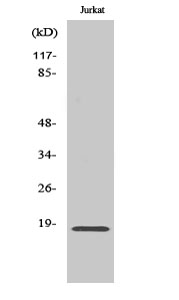
| WB | 咨询技术 | Human,Mouse,Rat |
| IF | 咨询技术 | Human,Mouse,Rat |
| IHC | 1/100-1/300 | Human,Mouse,Rat |
| ICC | 技术咨询 | Human,Mouse,Rat |
| FCM | 咨询技术 | Human,Mouse,Rat |
| Elisa | 1/40000 | Human,Mouse,Rat |
| Aliases | NMS; Neuromedin-S |
| Entrez GeneID | 129521; |
| WB Predicted band size | 24kDa |
| Host/Isotype | Rabbit IgG |
| Antibody Type | Primary antibody |
| Storage | Store at 4°C short term. Aliquot and store at -20°C long term. Avoid freeze/thaw cycles. |
| Species Reactivity | Human |
| Immunogen | Synthesized peptide derived from the C-terminal region of human Neuromedin-S. |
| Formulation | Purified antibody in PBS with 0.05% sodium azide,0.5%BSA and 50% glycerol. |
+ +
以下是关于Neuromedin-S抗体的3篇代表性文献的简要信息:
1. **文献名称**: *Identification of Neuromedin S as a Novel Hypothalamic Peptide with Anorexigenic Effects*
**作者**: Mori K. et al.
**摘要**: 该研究首次报道了Neuromedin-S(NMS)的发现,并开发了特异性抗体用于定位其在下丘脑的表达。研究揭示了NMS通过抑制食物摄入参与能量代谢调控,抗体被用于免疫组化分析其在脑区的分布。
2. **文献名称**: *Neuromedin S Exerts Anticipatory Activity through Oxytocin Signaling*
**作者**: Nakata M. et al.
**摘要**: 文章利用NMS抗体探究其在生物钟调节中的作用,发现NMS通过激活视交叉上核(SCN)的催产素通路调控昼夜节律。抗体被用于阻断实验,证实了其功能特异性。
3. **文献名称**: *Neuromedin S Regulates Adrenocorticotropic Hormone Secretion and Stress Response*
**作者**: Hanada R. et al.
**摘要**: 该研究通过NMS抗体抑制实验,证明NMS参与应激反应中促肾上腺皮质激素(ACTH)的释放调控,抗体应用帮助阐明其在下丘脑-垂体轴中的生理通路。
注:若需具体文献来源或年份,建议通过PubMed或Google Scholar以关键词“Neuromedin-S antibody”或“Neuromedin-S function”检索近年研究。部分早期研究可能需结合抗体应用场景进一步筛选。
Neuromedin-S (NMS) is a neuropeptide belonging to the neuromedin family, initially identified for its role in regulating circadian rhythms, energy homeostasis, and reproductive functions. It is primarily expressed in the suprachiasmatic nucleus (SCN) of the hypothalamus and acts through the neuromedin U receptor 2 (NMUR2), influencing stress responses, feeding behavior, and metabolic processes. Due to its involvement in these pathways, NMS has garnered interest in neuroscience and endocrinology research, particularly in studies exploring obesity, metabolic disorders, and circadian dysfunction.
Antibodies targeting Neuromedin-S are critical tools for detecting and quantifying this peptide in biological samples. They enable researchers to map NMS distribution in tissues, study its expression dynamics under varying physiological or pathological conditions, and investigate its interactions with receptors. These antibodies are typically developed in host species like rabbits or mice using immunogenic peptide fragments derived from conserved regions of NMS. Validation methods, such as ELISA, immunohistochemistry, or Western blotting, ensure specificity and sensitivity.
Recent studies highlight the therapeutic potential of modulating NMS signaling, driving demand for reliable antibodies to support preclinical research. Challenges include minimizing cross-reactivity with structurally similar peptides like neuromedin U. Overall, Neuromedin-S antibodies remain vital for unraveling the peptide's biological roles and advancing targeted therapeutic strategies.
×